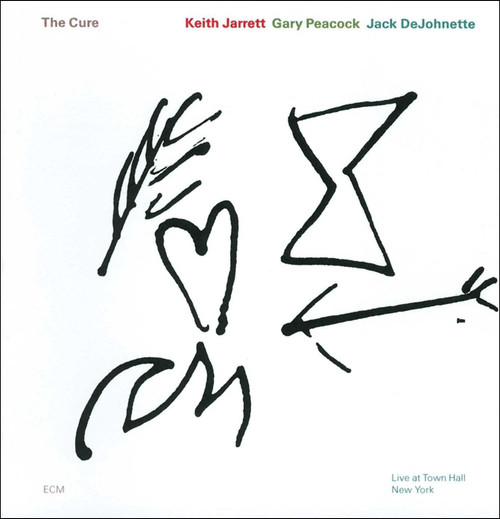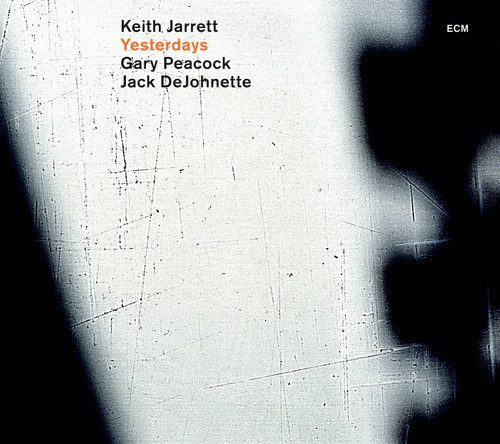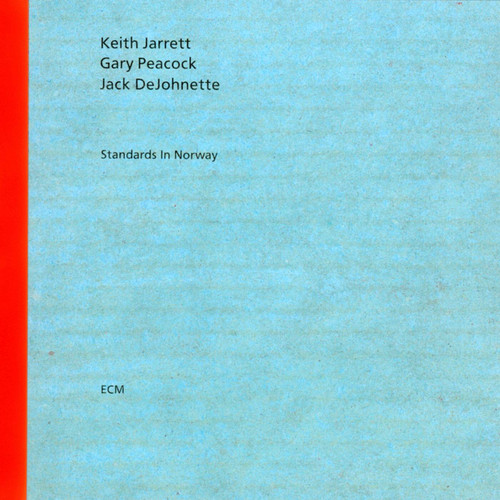On 'Inside Out', the 'Standards Trio' throws away the tunes and embarks on daring improvisations in a performance from the Royal Festival Hall, London. Keith Jarrett: 'Those of us who experimented a lot with so-called 'free' playing in the 60s have years of experience to bring to it again'. 'Inside Out' is a timely reminder that jazz is also about taking risks.
Tracklist:
1 From The Body 23:13
2 Inside Out 21:13
3 341 Free Ride 18:50
4 Riot 7:23
5 When I Fall In Love 7:25
Double Bass [Double-Bass] – Gary Peacock
Drums – Jack DeJohnette
Piano – Keith Jarrett
BACKGROUND
"Inside Out" marks a departure for the group often referred to as the "Standards Trio", or perhaps less a departure than a continuation of a process and a methodology that have always been important to the three players individually. One can say that "Inside Out" picks up where "Changeless" (ECM 1392) left off thirteen years earlier. Recorded at two revelatory concerts at London's Royal Festival Hall in July 2000, it finds the Standards Trio leaving standards behind. True, they arrive at a reading of "When I Fall In Love" to close the proceedings but the route they take is the indirect one. "Inside Out", for most of its duration, is a re-immersion in the swirling waters of free playing.
Reviewing the Festival Hall concert in The Guardian, John Fordham wrote, "The Standards Trio certainly played differently – although there was plenty of hushed rumination, there was also plenty of flat out jamming and animated, one-touch conversation... The Trio, though historically dedicated to the jazz-standards repertoire, has thrown away the maps and flown by the seat of its pants before, and this was just such a performance of startling fluency, of movement between orthodox and free improvising, familiar tunes sometimes appearing like wraiths at the edge of rich ensemble tapestries painted entirely on the fly... A brilliant motivic improviser, Jarrett develops his solos out of his encyclopaedically-informed love of melody, the secret of his success however freely he plays."
Keith Jarrett, from his liner notes: "The trio, thus far, has concentrated mostly on already existing material to use as a vehicle for improvising. But I've always been interested in turning things inside out, so I mentioned to Jack and Gary, during a tour in Europe, that perhaps we would scrap the format – the whole idea of having to use any material... Those of us who experimented a lot with so-called "free" playing in the 60s have years of experience to bring to it again..." Jarrett feels, rightly, that free playing is "an amazingly important part of the true jazz history", though it is an aspect of the music often glossed over by its chroniclers. Pulling the music out of the air makes its special demands: "We need to be even more in tune with each other to play this way, without material; and even more attentive. Every possibility is available if you take away the tunes, but only some are valid under the circumstances. It is only sensitivity to the flux that determines whether the music succeeds or fails."
Gary Peacock and Jack DeJohnette have a great deal of experience in free playing. Peacock worked all the parameters of the free jazz revolution in New York of the 1960s, from the glorious exaltations of Albert Ayler's "Bells" and "Ghosts" to the Paul Bley trio's brow-furrowed exploration of the free ballad. He ventures frequently into the free zone today, in the company of Marilyn Crispell.
While Peacock was overturning jazz orthodoxy on the East Coast, Jack DeJohnette was involved in parallel activities on Chicago's South Side. In 1963 he was a member of Muhal Richard Abrams' pioneering Experimental Band, whose line-up including fledgeling Art Ensemble of Chicago firebrands Roscoe Mitchell and Joseph Jarman. In 1966 in New York, DeJohnette played with John Coltrane, bridging the gap between the Coltrane groups with Elvin Jones and Rashied Ali. In Miles's electric group he brought a different touch to open-form improvising, sometimes alongside Keith Jarrett ("Live/Evil", "Miles At Fillmore" etc). Currently his primary context for improvising without tunes is his duo with British reedman John Surman.
For Keith Jarrett, free playing has meant many things, including what might happen in between the signposts or the exit signs that served as fixed materials in his historically important group with Paul Motian, Charlie Haden and Dewey Redman. His solo concerts have always been free, too, as have, in entirely different ways such projects as "Spirits" or "Book of Ways" or the experimental baroque organ recordings "Hymns/Spheres" and "Incantations" – some of which have very little to do with "jazz". The free playing at the Royal Festival Hall, however, plays plenty of attention to jazz's roots.
Keith Jarrett: "It should be obvious when listening to this CD how important the blues are here. We somehow couldn't avoid blues language in London, even in the context of free playing; the blues are so pervasive and true. Sometimes we live the blues even when we're free of the blues."










